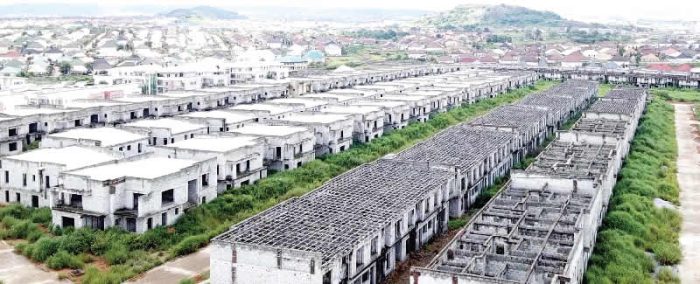The Economic and Financial Crimes Commission (EFCC) has linked Godwin Emefiele, the immediate past Governor of the Central Bank of Nigeria (CBN), to a sprawling property in Abuja comprising 753 duplexes and apartments.
The estate, located in the Cadastral Zone, Lokogoma District, spans 150,500 square meters and is described as the EFCC’s largest single recovery in its fight against corruption since its inception in 2003.
Justice Jude Onwuegbuzie of the FCT High Court in Apo ordered the forfeiture of the property on December 2, 2024. The EFCC’s investigation revealed that Emefiele allegedly acquired the estate through fraudulent means, using three companies to make payments totaling ₦2.2 billion.
In court documents obtained on Tuesday, the EFCC disclosed that the property had been abandoned since June 2023, following Emefiele’s arrest. Investigators reportedly traced the property using title documents retrieved from the office of one of Emefiele’s alleged associates, Ifeanyi Omeke.
The former CBN governor is currently facing prosecution in three separate cases involving charges of procurement fraud, forgery, and embezzlement of funds. He is accused of negotiating kickbacks in foreign exchange allocations and awarding contracts in exchange for illicit payments during his tenure.

In Lagos, Emefiele is standing trial for alleged fraud involving $4.5 billion and ₦2.8 billion. In Abuja, he faces charges for authorizing the printing of ₦684.5 million notes at an inflated cost of ₦18.96 billion.
The EFCC alleged that Emefiele used cronies to launder proceeds of corruption, acquiring multiple high-value properties in Lagos and Abuja. The agency stated that the directors of the companies involved in the transactions had been arrested and provided incriminating statements during the investigation.
“The funds used in acquiring the property are not legitimate earnings of Godwin Emefiele but proceeds of unlawful activities, including corrupt enrichment and abuse of office,” the EFCC investigator stated in a court affidavit.
The court had earlier granted an interim forfeiture of the property on November 1, 2024. With no opposition filed against the forfeiture, the court has now permanently transferred ownership of the estate to the Federal Government.
EFCC spokesperson Dele Oyewale defended the agency’s decision to initially withhold the identity of the property owner, citing provisions of the Advance Fee Fraud Act. “This is a civil proceeding targeting the property, not an individual. Since investigations are ongoing, revealing identities prematurely would be unprofessional,” he stated.
Efforts to reach Emefiele’s legal team, including senior lawyer Matthew Burkaa (SAN), for comments were unsuccessful at the time of this report.
The massive recovery has drawn public attention, with criticisms regarding the EFCC’s handling of the case and the concealment of ownership details. However, the anti-graft agency maintains that its actions align with legal protocols for unclaimed assets.
This case marks a significant milestone in the EFCC’s efforts to combat corruption and recover assets linked to unlawful activities in Nigeria.



